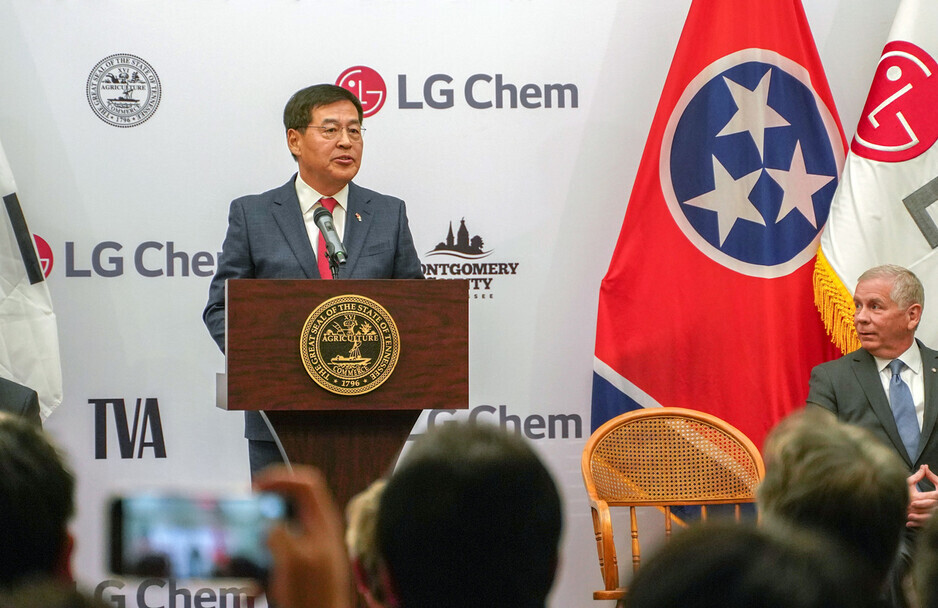hankyoreh
Links to other country sites 다른 나라 사이트 링크
[Editorial] Korean firms’ rapid investment in US after IRA raises concerns of hollowing local industry

Korean corporations are accelerating investment in the United States in response to Washington's enactment of the Inflation Reduction Act (IRA).
Investors now include battery material and parts makers, joining electric car manufacturers and electric car battery makers.
Amid the protectionist atmosphere in Washington, expanding investment in the US is unavoidable, but concern is emerging that an excessive rush toward the US could lead to the hollowing out of Korea's high-tech industries.
LG Chem announced Tuesday that it will invest US$3 billion to build a cathode materials plant for electric vehicle batteries in the US state of Tennessee.
The plant will produce 120,000 tons of cathode materials a year, making it the largest such plant in the US. Indeed, the figure far surpasses the combined production of LG Chem's cathode materials plants in Korea and China (90,000 tons annually).
The company's investment was prompted by the fact that a provision of the IRA pertaining to batteries goes into effect from next January.
The provision stipulates that to qualify for tax incentives, a certain percentage of battery components will need to come from North America, and a certain percentage of mined battery material will need to come from the US or countries with which the US has signed free trade agreements.
For individual companies, expanding investment in the United States is unavoidable, lest they fall behind in the rapidly growing US market for electric vehicles and electric vehicle batteries.
The problem is that excessive investment by Korean companies in the United States could weaken Korea's high-tech industrial ecosystem.
In the semiconductor and electric vehicles sectors, Samsung Electronics, Hyundai Motor and Kia have already announced plans for large-scale investments in the US. LG Energy Solution, Samsung SDI and SK On — Korea's top three battery makers — are also investing huge amounts of money to secure production bases in the United States.
When major corporations build factories in the United States, dozens of related subcontractors move with them. With some industry insiders already raising the possibility of local industries becoming hollowed out, there is enviable alarm.
Moreover, protectionist moves appear underway within the EU as well. France and Germany decided on Tuesday to consider a plan to respond with a "Buy European" program —modeled on the US "Buy American" program — if negotiations with Washington over the IRA fail.
If even Europe focuses on protectionism, open trading nations such as Korea will have less room to roam.
Seoul must work with countries in a similar position to persuade powerful nations to prevent the international trading order from tilting toward protectionism.
Domestically, Korea must also aggressively undertake policies to strengthen its industrial capacity, including supporting research and development in advanced industrial sectors and the cultivation of high-quality human resources, as well as protecting core technologies.
Please direct questions or comments to [english@hani.co.kr]

Editorial・opinion
![[Column] Season 2 of special prosecutor probe may be coming to Korea soon [Column] Season 2 of special prosecutor probe may be coming to Korea soon](https://flexible.img.hani.co.kr/flexible/normal/500/300/imgdb/original/2024/0426/3317141030699447.jpg) [Column] Season 2 of special prosecutor probe may be coming to Korea soon
[Column] Season 2 of special prosecutor probe may be coming to Korea soon![[Column] Park Geun-hye déjà vu in Yoon Suk-yeol [Column] Park Geun-hye déjà vu in Yoon Suk-yeol](https://flexible.img.hani.co.kr/flexible/normal/500/300/imgdb/original/2024/0424/651713945113788.jpg) [Column] Park Geun-hye déjà vu in Yoon Suk-yeol
[Column] Park Geun-hye déjà vu in Yoon Suk-yeol- [Editorial] New weight of N. Korea’s nuclear threats makes dialogue all the more urgent
- [Guest essay] The real reason Korea’s new right wants to dub Rhee a founding father
- [Column] ‘Choson’: Is it time we start referring to N. Korea in its own terms?
- [Editorial] Japan’s rewriting of history with Korea has gone too far
- [Column] The president’s questionable capacity for dialogue
- [Column] Are chaebol firms just pizza pies for families to divvy up as they please?
- [Column] Has Korea, too, crossed the Rubicon on China?
- [Correspondent’s column] In Japan’s alliance with US, echoes of its past alliances with UK
Most viewed articles
- 1Is Japan about to snatch control of Line messenger from Korea’s Naver?
- 2‘We must say no’: Seoul defense chief on Korean, USFK involvement in hypothetical Taiwan crisis
- 3[Editorial] Korea’s surprise Q1 growth requires objective assessment, not blind fanfare
- 4Division commander ordered troops to enter raging flood waters before Marine died, survivor says
- 5The dream K-drama boyfriend stealing hearts and screens in Japan
- 6S. Korea “monitoring developments” after report of secret Chinese police station in Seoul
- 7[Column] Season 2 of special prosecutor probe may be coming to Korea soon
- 8No good, very bad game for Korea puts it out of Olympics for first time since 1988
- 9[Column] ‘Choson’: Is it time we start referring to N. Korea in its own terms?
- 10Is N. Korea threatening to test nukes in response to possible new US-led sanctions body?